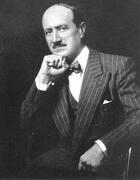
Saint John-Perse was born in Saint-Leger-à- Feuilles, a small Caribbean island in the Antilles, on May 31, 1887, with the name of Marie René Auguste Aléxis Saint Léger-Léger, into a family of local owners dedicated to the exploitation of coffee and sugar plantations. The earthquake that devastated Guadalupe in 1897 forced the family to return to the metropolis; there they settle in Pau. After briefly leaving studies due to the death of her father, she graduated in Law, Philosophy and Anthropology at the University of Bordeaux in 1910 and attended the Faculty of Sciences as a free student. In 1909 he finished his first book, Estampas para Crusoe, which was published in La Nouvelle Revue Française. Two years later he moved to Paris and edited Elogios. In 1916 he was sent to China, his first and only destination as a diplomat. There he would remain until 1921. During those years he traveled throughout Asia and wrote Anabasis, perhaps the most representative and well-known of his books, published in 1924 under the pseudonym of Saint-John Perse. On his return, he entered the Ministry of Foreign Affairs, where He worked as general secretary until his exile in 1940 .. With the German occupation and the establishment of the Vichy regime, the collaborationist authorities deprived him of French nationality, confiscated his properties and his Parisian home was looted. The poet leaves for the United States, where he works as an advisor to the Library of Congress in Washington, where he moves with his partner, Rosalía Sánchez Abreu, of Cuban descent. Providencial will be the renown that he enjoys in literary circles as a result of the English translation of Anabasis, made by T.S. Eliot in 1930. During these difficult years new books follow one another: Rains, Snows and Poem to the Stranger, conceived in New York during the winter of 1944. Never oblivious to the political reality of France, he allocates the copyright of some of these works to a French committee for the relief of war victims. As of 1945, the date of the writing of Vientos, Perse tackles the writing of Mares (1957). In 1958 he married New Yorker Dorothy Milburn Russel, at which time he wrote Chronicle, and in 1960, at age 73, he received the Nobel Prize for Literature. In 1962, and in dialogue with the work of the painter George Braque, he published his last great work, Birds. On Saturday, September 20, 1975, two days before the autumnal equinox, he died in his house on the Giens peninsula, on the edge of the Mediterranean.





